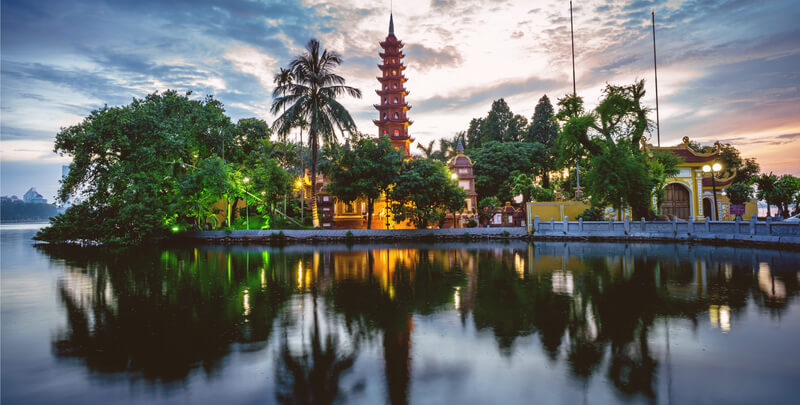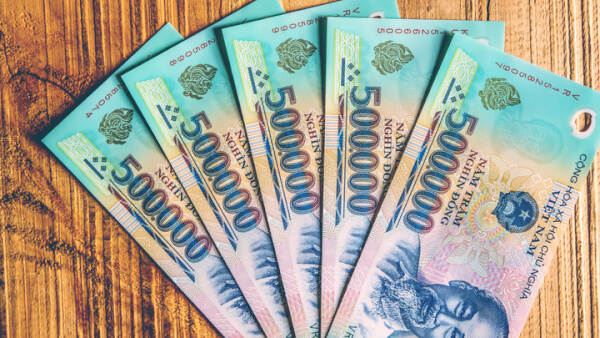Vaccinations for Vietnam: What you should know before you go
Vietnam is a beautifully tropical country filled with some of the warmest and friendliest people you’ll ever meet. From the chaotic streets of Hanoi to the...

While the U.S. Dollar is widely accepted in Vietnam, it’s often better to pay in the local currency - the Vietnamese Dong.
Shops, restaurants, taxi drivers and other service providers often make up their own exchange rates. So, paying in Dong ensures you get the fairest deal and avoids unpleasant arguments.
Thankfully, finding ATMs in Vietnam is quite easy, even though using them does have its challenges.
Here’s what you need to know.
You’ll find several ATMs at Vietnam’s major airports. They’re also plentiful around city streets and next to convenience stores, bars and restaurants. Vietcombank has the most ATMs in Vietnam. A number of international banks also have ATMs across the country. These include ANZ, Citibank and HSBC.
Ask your bank to confirm whether your card will work in Vietnam. Most ATMs accept Plus (Visa) debit and credit cards. ATMs that accept Cirrus and Maestro (MasterCard) are less common. You can find the nearest ATM on Visa’s online ATM locator or MasterCard’s online ATM locator.
Chip-and-pin ATMs are rare in Vietnam. Make sure your card has a magnetic stripe on the back, as a chip-and-pin only card probably won’t work.
ATMs in Vietnam use six-digit PINs. If your PIN is four digits long, you can usually get around this by adding two zeros in front. However, it’s best to ask your bank about this. Also, it is a good idea to let your bank know when you’ll be in Vietnam, so they won’t flag your transactions as suspicious and freeze your card.
Vietnamese ATMs have rather low per-transaction withdrawal limits.
ATMs in Ho Chi Minh City usually dispense up to VND 4 million per transaction. Once you leave the city, however, it’s rare to find ATMs that dispense more than VND 2 million per transaction.
Don’t let those numbers shock you, though. Use an online currency converter to find out how much that is in your local money. In fact, the cost of living in Vietnam is rather low; and VND 2 million should be more than enough for at least a couple of weeks. That said, making one large withdrawal is often cheaper than making two small ones, so it’s a good idea to make withdrawals before you leave Ho Chi Minh City (more on this later).
Many Vietnamese vendors won’t accept torn money bills, so always check your banknotes after a withdrawal to make sure none of them are badly damaged.
Many Vietnamese banks charge ATM fees.
Fees vary from bank to bank, but you can expect to be charged between VND 30000 and VND 55000 per withdrawal. Some banks have much higher fees. Most ATMs will warn you that you’ll be charged. However, they might not display the actual amount.
Your home bank may also charge fees. Charges usually include a withdrawal fee and a foreign transaction fee. These are charged in addition to the withdrawal fee levied by the Vietnamese ATM.
Vietnamese ATMs can only dispense Dong. However, they might ask you if you’d like to be charged in your home currency. Always say no, as this is an exchange rate rip-off. Withdrawals calculated in the local currency are calculated at the mid-market rate - the best rate you can get. If your withdrawal is charged in your home currency, however, the ATM will mark up your exchange rate. This rarely ever works out in your favour.
It’s hard, but not impossible, to avoid paying ATM fees in Vietnam. You can also keep them to a minimum. Here’s how.
Unfortunately, no bank in Vietnam is part of an international fee-free network such as the Global ATM Alliance.
However, your bank may have a partnership with a Vietnamese bank that would allow you to use its ATMs fee-free or at a reduced cost. It is definitely worth checking into this with your home bank, just in case.
ANZ and Citibank customers can use these banks’ ATMs in Vietnam without paying a withdrawal fee. HSBC also offers fee-free withdrawals, but only if you’re an Advance or Premier customer.
It can sometimes be favorable for you to use these banks’ ATMs even if you aren’t a customer, because they have much larger per transaction withdrawal limits than other banks. Do keep in mind, however, that their per transaction fees are also on the high side.
ANZ ATMs in Ho Chi Minh City have a VND 10 million per transaction limit. Citibank’s ATMs have a per transaction limit of between VND 5 million and VND 8.5 million, depending on the location (airports tend to have higher limits). HSBC’s limit is VND 4.8 million.
Your bank back home may also apply per transaction or daily withdrawal limits. Make sure the amount is within your home bank’s limit before attempting to withdraw any funds.
Some banks don’t charge ATM and foreign transaction fees. If you travel frequently, it may be worth switching banks so you can benefit from a fee-free card.
It is also important to never use a credit card to make ATM withdrawals. Paying with a credit card is a lot more expensive than using a debit card. This type of withdrawal is considered a loan, so you’ll be charged fees and interest on the amount.
If you or a friend have a Vietnamese bank account, use Wise to make a send money to Vietnam ahead of time and save even more. Not only does the real mid-market exchange rates Wise offers generally beat the banks, but because your money is received and sent locally in both your home country and in Vietnam, all those nasty international fees magically disappear.
*Please see terms of use and product availability for your region or visit Wise fees and pricing for the most up to date pricing and fee information.
This publication is provided for general information purposes and does not constitute legal, tax or other professional advice from Wise Payments Limited or its subsidiaries and its affiliates, and it is not intended as a substitute for obtaining advice from a financial advisor or any other professional.
We make no representations, warranties or guarantees, whether expressed or implied, that the content in the publication is accurate, complete or up to date.

Vietnam is a beautifully tropical country filled with some of the warmest and friendliest people you’ll ever meet. From the chaotic streets of Hanoi to the...

The first six months of 2016 saw over 4.7 million foreign visitors arriving in Vietnam - an impressive 21% increase on the previous year. If you’re planning a...